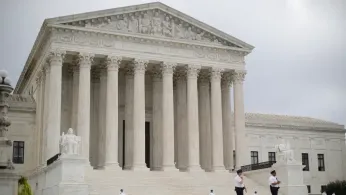
Aug 15
Supreme Court Allows Mississippi to Require Age Verification on Social Media Like Facebook and X
Mark Sherman and Lindsay Whitehurst READ TIME: 2 MIN.
WASHINGTON (AP) — The Supreme Court on Thursday refused for now to block enforcement of a Mississippi law aimed at regulating the use of social media by children, an issue of growing national concern.
The justices rejected an emergency appeal from a tech industry group representing major platforms like Facebook, X and YouTube.
NetChoice is challenging laws passed in Mississippi and other states that require social media users to verify their ages, and asked the court to keep the measure on hold while a lawsuit plays out.
There were no noted dissents from the brief, unsigned order. Justice Brett Kavanaugh wrote that there's a good chance NetChoice will eventually succeed in showing that the law is unconstitutional, but hadn't shown it must be blocked while the lawsuit unfolds.
NetChoice argues that the Mississippi law threatens privacy rights and unconstitutionally restricts the free expression of users of all ages.
A federal judge agreed and prevented the 2024 law from taking effect. But a three-judge panel of the 5th Circuit U.S. Court of Appeals ruled in July that the law could be enforced while the lawsuit proceeds.
It’s the latest legal development as court challenges play out against similar laws in states across the country.
Parents and even some teenagers are growing increasingly concerned about the effects of social media use on young people. Supporters of the new laws have said they are needed to help curb the explosive use of social media among young people, and what researchers say is an associated increase in depression and anxiety.
Mississippi Attorney General Lynn Fitch told the justices that age verification could help protect young people from “sexual abuse, trafficking, physical violence, sextortion and more,” activities that Fitch noted are not protected by the First Amendment.
Communications director MaryAsa Lee said the state is grateful for the decision, and expects the case to proceed “in a way that permits thoughtful consideration of these important issues.”
NetChoice represents some of the country’s most high-profile technology companies, including Google, which owns YouTube; Snap Inc., the parent company of Snapchat; and Meta, the parent company of Facebook and Instagram. NetChoice has filed similar lawsuits in Arkansas, Florida, Georgia, Ohio and Utah.
Paul Taske, co-director of the NetChoice Litigation Center, called the decision "an unfortunate procedural delay.”
“Although we’re disappointed with the Court’s decision, Justice Kavanaugh’s concurrence makes clear that NetChoice will ultimately succeed in defending the First Amendment — not just in this case but across all NetChoice’s ID-for-Speech lawsuits," he said.






